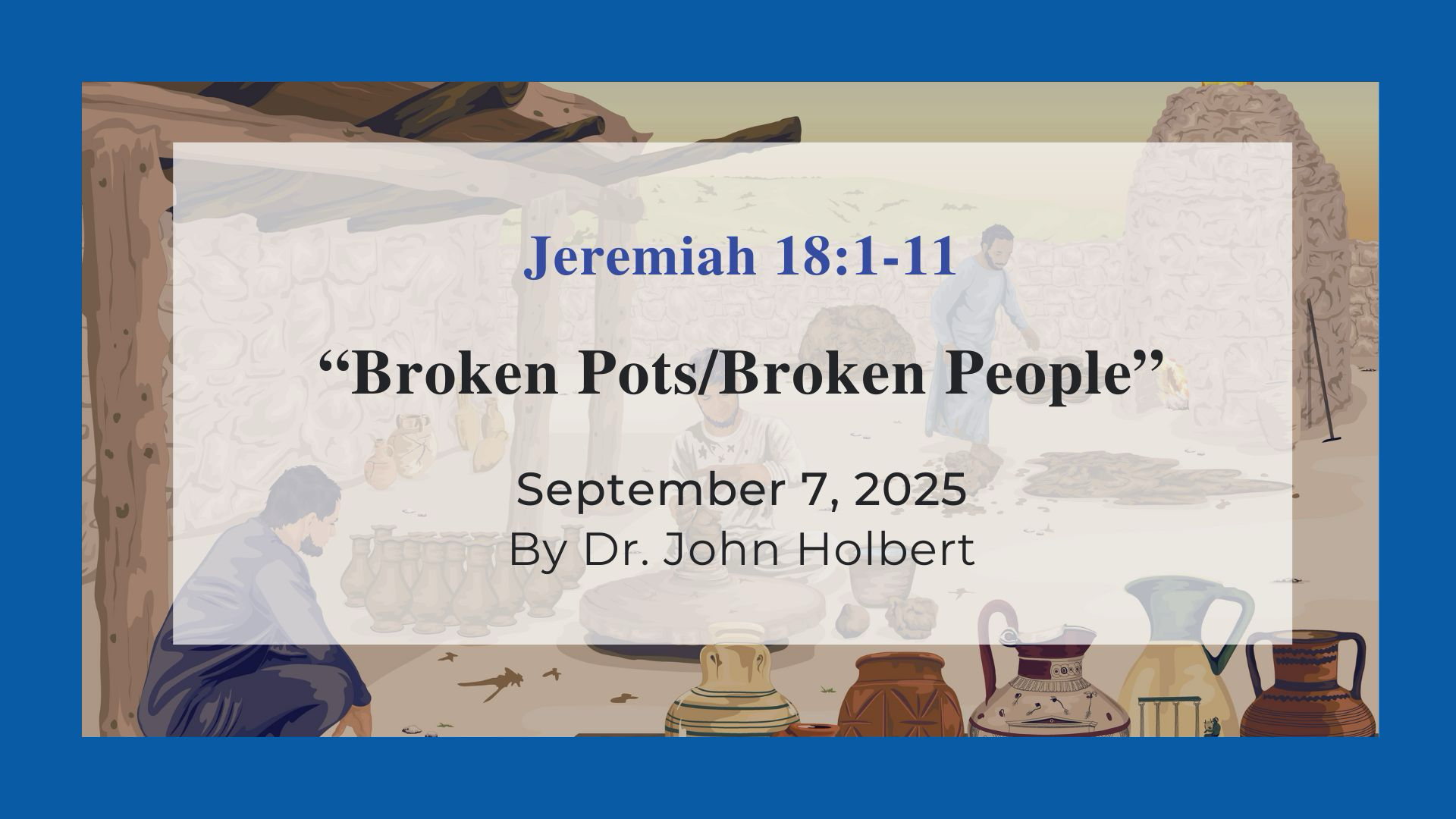Broken Pots/Broken People - Reflections on Jeremiah 18:1-11, Pentecost 13, Year C
by John C. Holbert on Monday, June 9, 2025

One of the more memorable oracles recorded in the book of Jeremiah is found in Jer.18. “The word that was for Jeremiah from YHWH: ‘Get up and go down to the house of the potter and there I will make you hear my word’” (Jer.18:1-2). The prophets of Israel were regularly asked by their God to perform outlandish acts or to discover YHWH’s words hidden in common activities. Consider Amos’ time in the temple of Bethel when a simple basket of fruit means for him not the joys of a wonderful harvest, but instead a sign of the end of Israel! Only the prophet experiences the pun in the event: “basket” is qayitz while “end” is qetz in Hebrew. Or imagine Isaiah naming a son Maher-shalal-hash-baz, something like “Speedy spoil, quick plunder,” in English, a sign that Assyria will soon plunder the wealth of Damascus and Samaria, before the boy can even say “father or mother” (Is.8:3-4). Many other strange examples could be easily provided.
In today’s prophetic event, Jeremiah is to go to the house of the potter, or perhaps more literally the “house of the artisan,” since the noun used can mean many sorts of artistry. But we soon learn that this is indeed the house of a potter. The potter in any ancient land was an extremely important person. Every day use pottery was always needed since cheap clay vessels were forever being shattered and needed replacement. It is hardly an accident that the most important items used for dating ancient archaeological sites were the cheap pottery. The shape of the rims and the painting on the jugs and plates and jars provide crucial clues as to when they were created. Usually, the pottery appears in shards only, but searching the waste dumps of villages and towns turns up massive numbers of such broken remnants and leads to many insights about the time and the particular dates of those times.
Pottery houses are thus common and important places of near-constant activity. Jeremiah goes into the local one, and observes the potter at work at his wheel. As the wheel spins, and as the potter’s trained hands shapes the softened and wet clay, the prophet notes that the potter must quite regularly stop his shaping actions, because too often his shaping attempts fail, and the clay must be smashed down again into a lump before it may once again be shaped. That failure is a regular feature of any potter’s work. Jer.18:4 makes this plain: “The vessel he was making of clay by the potter’s hand was spoiled, so he reworked it into another vessel that was pleasant in his eyes.” This is a scene that was repeated day after day in every village in Israel and elsewhere in the ancient East.
But when a prophet is in attendance, meanings of a different sort come clear. YHWH now becomes the potter of Israel. “Am I not able to do exactly the same thing with you, house of Israel, just as this potter has done? Just like the clay in the potter’s hand, so are you in my hand, house of Israel” (Jer.18:6). Of course, such a metaphor can cut both ways, either negatively or positively. YHWH may shape Israel for good, or YHWH may smash the lump of clay and start again. YHWH might change the divine mind about an evil plan against the nation, “if the nation turns from its evil” (Jer.18:8). YHWH may then “build and plant” that nation, thus fulfilling part of Jeremiah’s call in Jer.1:10.
However, according to this particular oracle, YHWH’s intention is negative. “Thus says YHWH! Look! I am a potter shaping evil against you and scheming a plan against you. Turn right now, each of you, from your ways of evil, and make your ways and your actions good” (Jer.18:11). The text ends with a dire warning; YHWH as potter is this day in a smashing mood, since the lump of clay has failed and needs a complete makeover. But that can only occur when the lump turns from evil to good, from a shattered lump to a useful jar.
I vividly remember a time some years ago, when I was preaching on this text for a group of United Methodist District Superintendents (a group that works administratively to aid the bishops in their work of General Superintendency, making pastoral appointments and overseeing pastoral work in designated districts of an annual conference). The setting was Lake Junaluska, a lovely spot in North Carolina, a kind of “Methodist Mecca” in that part of the world. I was accompanied by a wildly creative person, who, while I was preaching on this text, was behind me, shaping and smashing pots—quite loudly and raucously! We were both standing on some sort of plastic covering to absorb the huge numbers of shards of pottery she was creating as she hurled them to the floor. Needless to say, it was a sharply memorable preaching event! And I should say it made the point of the text with forceful clarity. Jeremiah warned Israel, and us, that God is potter, and we are clay, and despite that rather romantic hymn tune—“You are the potter, and we are the clay”—God can use the divine artistry not only to shape us for good, but unless we come clean about our profound shortcomings, that same God can reshape our clay after some unpleasant smashing actions. Jeremiah, like his prophetic colleagues before and after him, tells us that refusal to worship YHWH alone and a related refusal to show concern for society’s marginalized ones could well lead to a very unpleasant action from the divine potter. As that famous prophet of the New Testament was fond of saying, “Let those who have ears, hear!”
